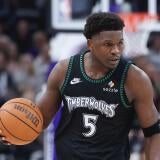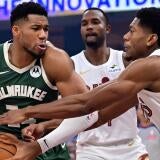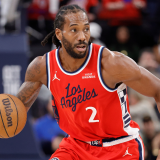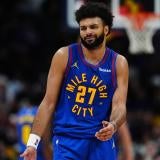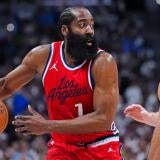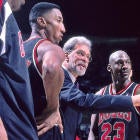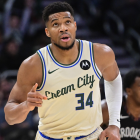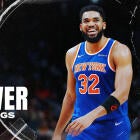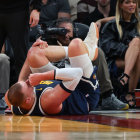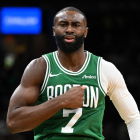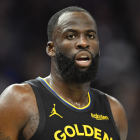'The Last Dance': What happened to Michael Jordan, Scottie Pippen, Bulls' other key figures after 1998 Finals
The Bulls disbanded following their sixth NBA title; here's where each pivotal member of the team is now
"The Last Dance" is officially in the books as ESPN has aired the final episodes of its epic 10-part documentary on the career of Michael Jordan and the 1997-98 Chicago Bulls. However, that doesn't mean the story ends there. It's not as though the NBA ceased to exist without Jordan to carry it on his shoulders. Virtually every player on his title-winning rosters went on to do something else of note in professional basketball or elsewhere.
So with the documentary wrapping things up in 1998, let's pick up where it left off. Here's where all of the key figures from Jordan's championship runs are now.
Scottie Pippen
Pippen's longstanding feud with Bulls management came to an end after the 1998 championship. He managed to secure a hefty five-year, $67 million contract from the Houston Rockets in free agency, and the Bulls even facilitated a salary bump for him by structuring it as a sign-and-trade.
Pippen spent only a season in Houston due to his distaste for Charles Barkley. He asked for a trade, ideally to Phil Jackson's Lakers, and ultimately landed on the Portland Trail Blazers. There he spent his last few meaningful years in the NBA, most famously defending Kobe Bryant on his legendary alley-oop pass to Shaquille O'Neal in Game 7 of the 2000 Western Conference finals. When his time in the league was coming to a close, the Bulls gave him one last apology in the form of a two-year, $10 million golden parachute in 2003. He played only 23 games on that contract before retiring.
Yet even now, things are not perfect between the Bulls and No. 33. He revealed earlier this season that he had been fired from his role as a team ambassador after Chicago moved on from former teammate John Paxson as its top basketball decision-maker. He currently appears on NBA studio shows for ESPN.
Toni Kukoc, Ron Harper, Bill Wennington
Chicago's last dance wasn't quite so final for some Bulls. Championship mainstays Kukoc, Harper and Wennington remained with the Bulls after Jerry Krause detonated their roster. Kukoc had a career year in 1999, averaging 18.8 points, 7.0 rebounds and 5.3 assists as the Bulls lost game after game. He remained in the NBA for several seasons afterward and remains an advisor to Jerry Reinsdorf to this day.
Harper didn't fare quite as well individually, but after one last productive year in Chicago, he followed Jackson to Los Angeles where he won two more championships as a Lakers role player. Harper dabbles in media and is an active supporter of the National Stuttering Association having himself overcome a stutter in his youth.
Wennington lasted two more years in the NBA, both with the Bulls. He is now a radio commentator for the Bulls, and was elected to the Canadian Basketball Hall of Fame in 2005.
Steve Kerr
Kerr left the Bulls for San Antonio in 1999 and won two more championships as a Spur, but his playing career is perhaps the least interesting thing he's done since leaving Chicago. Kerr opened his retirement by becoming one of the best analysts in television for TNT. He parlayed his success there into a GM job with the Phoenix Suns, nearly taking them to the Finals in 2010 before surprisingly stepping down.
In 2014, he decided to pursue coaching and was offered two jobs. One came from his former mentor, Jackson, who by then was running the New York Knicks. Kerr considered it, but decided to take over the Golden State Warriors. Three championships later, it's safe to say he made the right decision.
Horace Grant
Grant's career blossomed outside of Jordan's shadow. He achieved not only All-Star status after Jordan left the Bulls, but eventually became one of the NBA's highest-paid players with the Orlando Magic. He remained there for nearly the rest of his career, though he picked up a fourth championship during a brief stint with the Lakers. He now serves as an ambassador for the NBA, traveling abroad to promote the game.
Luc Longley, Jud Buechler, Scott Burrell
Kerr's career after leaving the Bulls may have been eventful, but the same can't be said for Chicago's other departing role players. Longley landed a hefty deal in Phoenix, but retired midway through it due to injuries. Buechler hung around for a few years as well, playing in Detroit and Orlando before calling it quits. He is currently an assistant coach for the Knicks. Burrell signed with the Nets in 1999, but his playing career took a number of detours in minor and foreign leagues after that. He has since returned to his home state where he coaches the Southern Connecticut State Fighting Owls.
Jerry Krause
Krause got to live out his dream of rebuilding the Bulls without Jordan, but it turned into a nightmare. After a miserable 1999 season, his Bulls won the lottery and landed a franchise player in Elton Brand. Unfortunately, Krause decided to trade him two years later in order to rely on the high-school tandem of Eddy Curry and Tyson Chandler. No move better exemplifies his post-Bulls tenure. In addition to Brand, Krause also drafted Ron Artest and Jamal Crawford, both of whom were traded before reaching maturity.
The Bulls never again reached the playoffs under Krause. He resigned from his post in 2004 due to health issues, but still scouted in baseball for several years afterward. He died in 2017 after dealing with a number of health issues.
Dennis Rodman
The Bulls may have been able to tolerate Rodman's antics, but other teams could not. Rodman signed with the Lakers in the 1999 offseason, but lasted only 23 games before being released. The Dallas Mavericks gave him another 12 games, and that was that. Rodman was forced into retirement in 2000.
He has maintained a steady media presence after retiring and even dabbled in professional wrestling. His most well-known exploits, though, have taken place in North Korea. He has developed a surprising friendship with North Korean leader Kim Jong-Un, and in 2014, a tweet of his even contributed to the release of an American prisoner there. He has made several trips to North Korea over the past seven years, and was among the first Americans ever to meet Kim Jong-Un.
B.J. Armstrong
Armstrong may have been the smallest Bull on the championship rosters, but his shadow now looms large over the entire NBA. He has become one of the league's most powerful agents since retiring. Among his impressive list of clients? Former Bulls star Derrick Rose. At the moment, only Kerr can claim to have a greater influence over the game than Armstrong among former Bulls still working in basketball.
Phil Jackson
The 1997-98 season may have been Jackson's last dance in Chicago, but it was only a midpoint for his coaching career. After taking a year off, he took over the Lakers in 1999 and immediately led them to three championships. His relationship with star Kobe Bryant deteriorated to the point that he left the team in the 2004 offseason, but returned a year later to lead the Lakers to two more championships. In 20 full seasons as a head coach, Jackson has 11 championships, giving him titles in more than half of the years he spent leading a team.
He landed his dream job in 2014, taking over the very same Knicks team that he played for in the 1970s. But unlike Chicago and Los Angeles, his tenure in New York included no championships. Among the reasons were his stubborn commitment to the outdated triangle offense, an inability to connect with stars Carmelo Anthony and Kristaps Porzingis and, ironically, multiple poor coaching hirings. After leaving the team in 2017, he moved back to Montana, where he still resides today.
Jerry Reinsdorf
The Jordan era seemingly had an enormous impact on Reinsdorf's management of the team. John Paxson served as his top decision-maker for nearly two decades. Bill Cartwright was his head coach for two years, and his interim replacement was Pete Myers. Doug Collins has spent the past few years as one of his top advisors. Prior to the recent hire of Arturas Karnisovas as the team's new vice president of basketball operations, most of Reinsdorf's hires were related to the championship teams in some way.
Reinsdorf was elected to the Hall of Fame in 2016, and still owns both the Bulls and the Chicago White Sox, though he has largely ceded control over his NBA team to his son, Michael.
Michael Jordan
Despite what "The Last Dance" would have you believe, Jordan's NBA career did not, in fact, end after Game 6 of the 1998 NBA Finals. After a brief hiatus, he took over as the general manager of the Washington Wizards and eventually decided to return and play for the team that he built. The results were mixed. While Jordan was selected for the All-Star Game in both Wizards seasons, he didn't make the playoffs in either and retired for good in 2003.
He quickly bought a stake in the expansion Charlotte Bobcats, and eventually, became the team's majority owner. His greatest achievement in running the team? Rebranding it back into the Hornets, adopting their beloved color scheme from the 1990s.
There's something fitting about Jordan attempting to recapture the past in that way. While he dominated the NBA as a player, his track record as an executive is decidedly less successful. The Hornets have made the playoffs only twice under his stewardship. If his team can't play as well as he did, they can at least look like they come from his era. While 1998 may not technically have been Jordan's last dance, it was his last true moment at the center of the basketball world.


